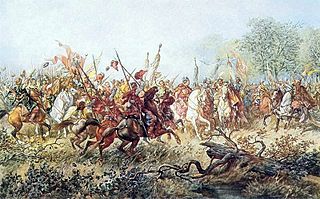 W
WThe Battle of Batih, also known as the Battle of Batoh, was a battle in 1652 in which Polish-Lithuanian forces under hetman Marcin Kalinowski were defeated by a united army of Crimean Tatars and Zaporozhian Cossacks. A day after the battle the Cossacks bought the Polish captives from the Tatars. In the following two days all the prisoners were slain.
 W
WThe Battle of Berestechko was fought between the Ukrainian Cossacks, led by Hetman Bohdan Khmelnytsky, aided by their Crimean Tatar allies, and a Polish army under King John II Casimir. It was a battle of a Cossack rebellion in Ukraine that took place in the years 1648–1657 after the expiration of a two-year truce. Fought from 28 to 30 June 1651, the battle took place in the province of Volhynia, on the hilly plain south of the Styr River. The Polish camp was on the river opposite Berestechko and faced south, towards the Cossack army about two kilometers away, whose right flank was against the River Pliashivka (Pliashova) and the Tatar army on their left flank. It is considered to have been among the largest European land battles of the 17th century.
 W
WThe Battle of Bila Tserkva was fought on 24–25 September 1651 near the city of Bila Tserkva as part of the Khmelnytsky Uprising. It was fought between the Zaporozhian Cossack Army and their Tatar allies and the Polish–Lithuanian Commonwealth.
 W
WBattle of Korsuń, was the second significant battle of the Khmelnytsky Uprising. Near the site of the present-day city of Korsun-Shevchenkivskyi in central Ukraine, a numerically superior force of Cossacks and Crimean Tatars under the command of Hetman Bohdan Khmelnytsky and Tugay Bey attacked and defeated Polish–Lithuanian Commonwealth forces under the command of Hetmans Mikołaj Potocki and Marcin Kalinowski. As in the previous battle at Zhovti Vody, the outmanned Commonwealth forces took a defensive position, retreated, and were thoroughly routed by the opposing force.
 W
WThe Battle of Loyew was a battle of the Khmelnytsky Uprising. Near the site of the present-day town of Loyew in Belarus, a numerically superior force of Ukrainian Cossacks under the command of Cossack warleaders Stepan Pobodailo and Mykhailo Krychevsky was defeated by the Polish–Lithuanian Commonwealth forces under the command of hetman Janusz Radziwiłł. Radziwiłł was able to engage the Cossack forces before they merged. First, he defeated the army of Krychevsky, who was mortally wounded; then he defeated Pobodailo's army.
 W
WBattle of Loyew, was a battle of the Khmelnytsky Uprising. Polish–Lithuanian Commonwealth forces under the command of Janusz Radziwiłł defeated the Cossack forces under the command of Martyn Nebaba.
 W
WThe Siege of Zbarazh was a 1649 battle of the Khmelnytsky Uprising. The Polish–Lithuanian Commonwealth forces held their positions besieged in the Zbarazh Castle until in the aftermath of Battle of Zboriv and the Treaty of Zboriv the hostilities paused and the siege ended. These events were described by Henryk Sienkiewicz in his novel With Fire and Sword (1884).
 W
WThe Battle of Zboriv, during the Khmelnytsky Uprising, was fought near the vicinity of Zborów on the Strypa River, and near the Siege of Zbarazh. The battle was fought between the combined Cossack-Crimean force and the Crown army of the Polish–Lithuanian Commonwealth.
 W
WBattle of Zhovti Vody was the first significant battle of the Khmelnytsky Uprising. The name of the battle derived from a nearby Zhovta River.
 W
WThe Battle of Zhvanets, or the Siege of Zhvanets was one of battles of the Khmelnytsky Uprising. It took place between late August and mid-December 1653, when forces of the Polish–Lithuanian Commonwealth, together with King Jan Kazimierz Waza were surrounded in and near Zhvanets by Zaporozhian Cossacks and Crimean Tatars, commanded Bohdan Khmelnytsky. The siege ended when Poles agreed to renew the Treaty of Zboriv.